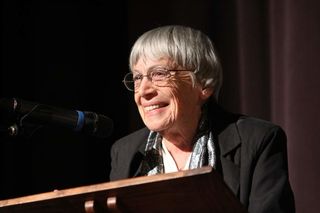Career
Ursula K. Le Guin's Strong Opinions about Writing in Flow
Understanding flow may be more complex than you think.
Posted March 1, 2018

I had already read their books. Then I interviewed them, in person or by phone or mail. By the time I had completed dozens of interviews, analysed the data, and written my dissertation and the book (Writing in Flow) that followed, I felt as though I knew these novelists and poets.
Later, whenever one of my writers died (see NOTE below for names), it was hard for me to let them go.
Ursula K. Le Guin is the latest of my writers to die. I dug out her responses to my "writing in flow" questionnaire, which Le Guin responded to by letter in her own clear, earnest, and elegant way.
What follows here is the full transcript of her never-before-published letter. Re-reading it now, I appreciate her wisdom anew. When Le Guin insisted that trying to define the flow state of consciousness risks simplifying something "extremely elusive, subtle, varied, and complex," I most heartily agree.
I am also certain that if we are only able to skitter around the fractaling edges of a particular state of mind, what we learn can be intriguing and useful.
URSULA K. LE GUIN on FLOW:
What you are calling "flow state" seems to me to be the condition in which all skilled work is done — work one has learned how to do so that the concrete aspects of it have become automatic — including muscular coordination and total familiarity with the medium (whether the medium be paint, or basket-withes or a dancer's own body or, for a writer, word-sound, syntax, etc.).
The only decisions a skilled artisan or artist makes during the work are aesthetic ones. Since aesthetic decisions are not rational ones, they are made on a level that doesn't fully coincide with rational consciousness. Many artists feel that they are in something resembling a trance state while working, and that the decisions the work involves are not made by them, but by the work.
This is not however so distinct or simple a condition that I can answer questions such as "what were you doing immediately before you entered flow", etc. I believe the repetition of the words "flow state, flow," tend to reify a psychic state or set of states which is in fact extremely elusive, subtle, varied, and complex. The language of your questions rather implies that getting "into the flow" of work is like popping into and out of a bathtub. It's not that clear and not that simple; to make it clear and simple is to falsify it dangerously.
Consciousness of audience while writing is fatal to the work. While I am writing I am absolutely not conscious of my body or of my self; only if the work is impeded do I return to selfconsciousness. If I become body- or selfconscious it impedes the work ("breaks the flow"): comes between the doer and the deed, which, when the work is going right, are one. (See Yeats's chestnut tree.)
I do not use pre-writing rituals. I compose sometimes with a pen and notebook, sometimes on the computer; it makes no difference. If all I had was a chisel and a rock I would write on the rock.
What is a "writing block"? Do cabinetmakers have blocks? Do dancers have blocks? Weavers? Quilters? I think this is another case of reification, endorsed by writers who (being wordy people) are terrified of the wordless silence of germination.
I consider the gift of being absorbed into my work the greatest pleasure and the noblest privilege of my life.
Ursula K. Le Guin's final book is a compilation of some of her blog posts called No Time to Spare: Thinking About What Matters. It's a delight to read.
NOTE: Among the other authors and poets who contributed to Writing in Flow and have since died are Myra Cohn Livingston, Carolyn See, Richard Wilbur, Harriet Doerr, Sue Grafton, Anthony Hecht, Philip Levine, Octavia E. Butler, and Stephen Perry (full interview to come).
(c) 2018 by Susan K. Perry, author of Writing in Flow and Kylie's Heel


